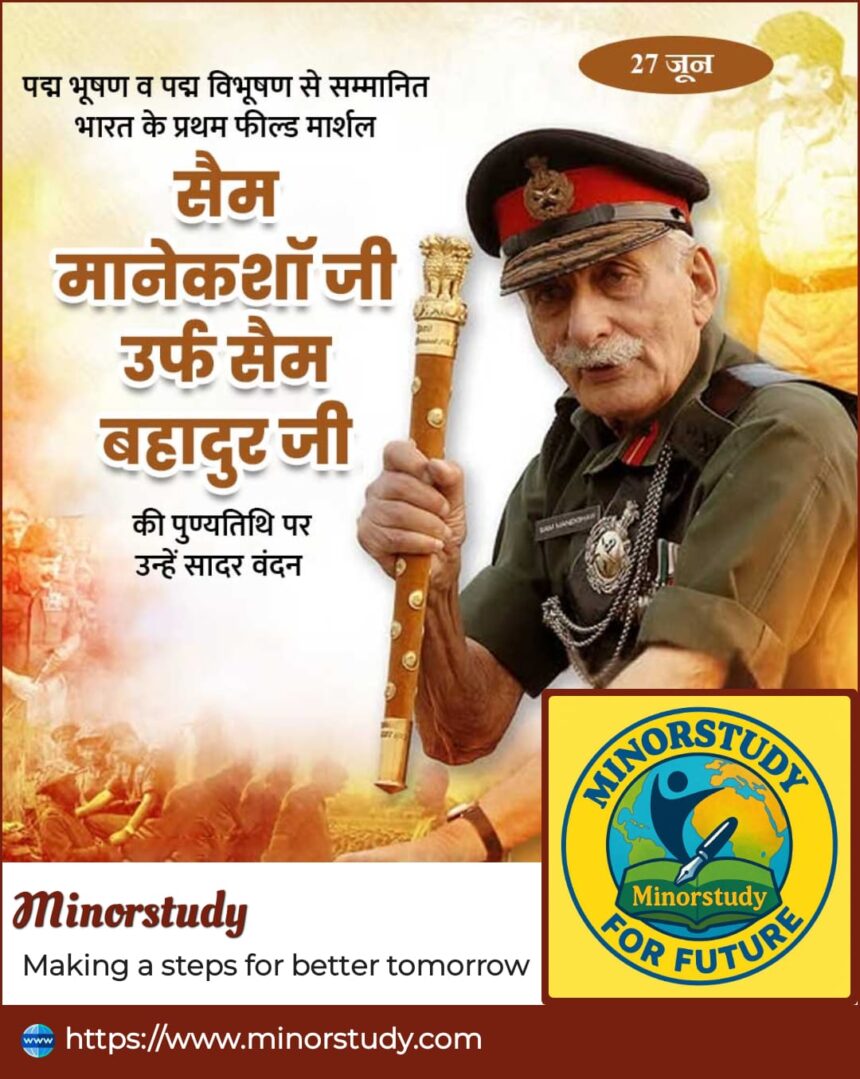10 Inspiring Lessons From Sam Manekshaw Ji’s Life That Prove He Was a Bold Champion
Sam Manekshaw: Field Marshal Sam Hormusji Framji Jamshedji Manekshaw, known fondly as Sam Bahadur, remains one of India’s most iconic military leaders—a man whose courage, wit, and bold decisions changed the course of history. His life story is not just about battles but about leadership, grit, strategic genius, and humanity. In this comprehensive article, we dive into his history, key facts, a detailed timeline, FAQs, significance, impact on daily life, observance, and more than 1,200 words of engaging, human-friendly storytelling.
- 10 Inspiring Lessons From Sam Manekshaw Ji’s Life That Prove He Was a Bold Champion
- 🧭 1. History of Sam Manekshaw – The Making of a Marshal
- 📌 2. Important Facts About Sam Manekshaw
- 🗓️ 3. Timeline: Key Milestones in Sam Manekshaw’s Career
- ❓ 4. FAQs About Sam Manekshaw Ji
- 🌟 5. Significance of Sam Manekshaw in Indian History & Society
- 💬 6. Wishing a Hero – Tribute to Sam Bahadur
- 🔧 7. How He Influences Our Daily Lives & Leadership
- ✅ 8. Important Observances and Legacy Moments
- 🎯 9. Key Leadership Lessons from Sam Manekshaw
- 🧠 10. Why Sam Manekshaw’s Legacy Matters to Society
- 📝 11. Conclusion – The Daily Echo of Sam Bahadur’s Principles
🧭 1. History of Sam Manekshaw – The Making of a Marshal
Born on March 3, 1914, in Amritsar, Manekshaw grew up in a vibrant Parsi family. He entered the Indian Military Academy at Dehradun in 1932—unusual at the time due to his average academic record, but his leadership skills and character set him apart.
Commissioned into the 5th Battalion, 10th Baluch Regiment of the British Indian Army in 1934, he saw active service in Burma during World War II, where he was wounded three times. These early experiences forged in him a deep sense of duty, bravery, and adaptability.
📌 2. Important Facts About Sam Manekshaw
| Fact | Detail |
|---|---|
| Full Name | Field Marshal Sam Hormusji Framji Jamshedji Manekshaw |
| Born | March 3, 1914, Amritsar, Punjab |
| Died | June 27, 2008, Wellington, Nilgiris, Tamil Nadu |
| Rank | Field Marshal (1973), India’s First |
| Honors | Padma Bhushan (1966), Padma Vibhushan (1972) |
| Wars Played | World War II (Burma), 1947–48 Kashmir War, 1962 Sino-Indian War, 1965 & 1971 Indo-Pakistani Wars |
| Known For | Unconventional strategies, sharp wit, exceptional leadership |
| Famous Quotes | “If a man says he’s not afraid of dying, he’s either lying or he’s a Gurkha.” |
🗓️ 3. Timeline: Key Milestones in Sam Manekshaw’s Career
| Year | Event |
|---|---|
| 1932 | Joins Indian Military Academy |
| 1934 | Commissioned into the 5/10 Baluch Regiment |
| 1942 | Wounded in Burma multiple times during WWII |
| 1947–48 | Leads operations in Kashmir post-independence |
| 1962 | Vice-Chief of Army Staff during the Sino-Indian War |
| 1965 | Commands Eastern Command in the Indo‑Pakistani War |
| 1969–73 | Chief of Army Staff; becomes Field Marshal in 1973 |
| 1971 | Masterminds decisive victory in Bangladesh Liberation War |
| 2008 | Passes away at age 94 in Wellington, Nilgiris |
❓ 4. FAQs About Sam Manekshaw Ji
Q1: Why was he appointed Field Marshal?
He was the first Indian Army officer to be promoted directly to Field Marshal in 1973—an honorary rank in recognition of his leadership during the 1971 war.
Q2: What made Manekshaw unique as a commander?
His wit, humility, strategic decisiveness, and refusal to bow under political or external pressure made him stand out. He famously delayed deploying troops to East Pakistan (now Bangladesh) until tanks and air support were ready—a move that sealed victory.
Q3: How did he respond during the 1962 Sino-Indian War?
While India faced setbacks, Sam Manekshaw warned the government early, requesting permission to withdraw troops to defensible positions, but his advice was ignored at the time.
Q4: Was he popular among soldiers?
Yes, his empathy, genuine care for the troops, and casual interactions—like drinking tea with jawans—made him immensely popular.
Q5: Did he receive international recognition?
His role in the 1971 war earned praise worldwide for his humane treatment of prisoners and dignified post-war behavior.
🌟 5. Significance of Sam Manekshaw in Indian History & Society
Sam Bahadur’s significance lies in his unconventional genius, his moral backbone, and a leadership style that blended discipline with empathy.
His Lasting Contributions:
Strategic brilliance in 1971, which changed South Asia’s political landscape.
Leadership during crises, including early warning during 1962.
Culture of dignity and decency in an often harsh environment.
Inspirational example for armed forces and leadership roles across society.
He demonstrated that leaders don’t need to be arrogant—they can be human-first and still deliver great results.
💬 6. Wishing a Hero – Tribute to Sam Bahadur
“May the spirit of Sam Manekshaw Ji continue to inspire generations—your courage, humor, and wholehearted leadership remind us that greatness lies in humanity as much as in victory.”
🔧 7. How He Influences Our Daily Lives & Leadership
Even outside the military, his leadership principles—humility, honest communication, decisive action—are taught in management schools, boardrooms, and civic leadership courses.
In Government & Corporate: Policies often reflect the idea of open communication and readiness to adapt.
In Education: His life is a case study in crisis leadership and ethics for administrators.
In Society: He showed that compassion is not weakness, but a tool for strength.
✅ 8. Important Observances and Legacy Moments
Field Marshal’s Day isn’t officially observed, but military units remember him on June 27, the anniversary of his passing.
Books & Documentaries: His autobiography “Soldier of India”, plus many documentaries preserving his leadership lessons.
Institutions: Schools, sports clubs, and events in India and abroad carry his name.
Quotes in Culture: His witty one-liners continue to be shared widely across media and leadership forums.
🎯 9. Key Leadership Lessons from Sam Manekshaw
Courage to speak up – He questioned political decisions when they didn’t align with troop safety.
Timing matters – He spot-on delayed action till the moment was decisive.
Command with compassion – Known for visiting soldiers behind the frontlines with simplicity and warmth.
Decisiveness – Once he agreed, he gave commands with conviction.
Humor under stress – His quips eased tension during wartime.
🧠 10. Why Sam Manekshaw’s Legacy Matters to Society
Champion of integrity: He refused retirement earlier than planned, insisting India needed him more during the 1971 crisis.
Voice of conscience in government-military relations.
Model of meritocracy: Promotions and roles were based on competence, not politics, under his watch.
Cultural unifier: He remains a figure of national pride beyond religion, caste, or region.
📝 11. Conclusion – The Daily Echo of Sam Bahadur’s Principles
Whether you’re a student, executive, soldier, or civic leader, Sam Manekshaw Ji’s ethos has something to teach:
Humility is powerful
Respect every individual
Stand firm on principles
Use wit to ease tension
Lead from the front with conviction
In our daily routines—be it a challenging meeting, a crisis, or a team project—remember his words and deeds. Sam Bahadur’s life shows that true leadership is courageous, compassionate, and always human-centric.
“To lead like Sam Manekshaw is to blend bravery with empathy, discipline with humor, and strategy with simple humanity.”









Discover rafting tara-montenegro-rafting.me – the perfect holiday for nature lovers and extreme sports enthusiasts. The UNESCO-listed Tara Canyon will amaze you with its beauty and energy.
Hello there, I found your website via Google while looking for a related topic, your web site came up, it looks good. I’ve bookmarked it in my google bookmarks.